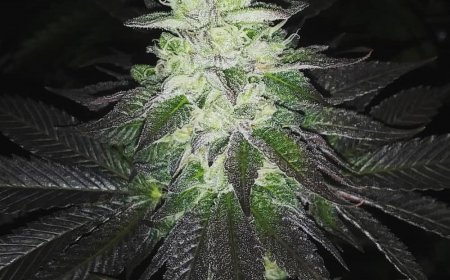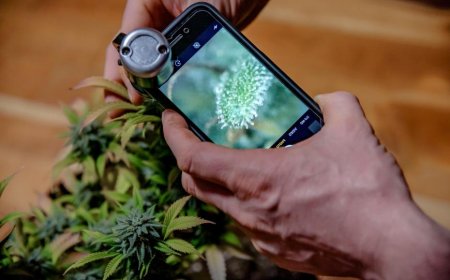How to Store Your Cannabis Buds
Learn how to store your cannabis buds with our guide on ideal conditions, storage containers, and tips for maintaining freshness.
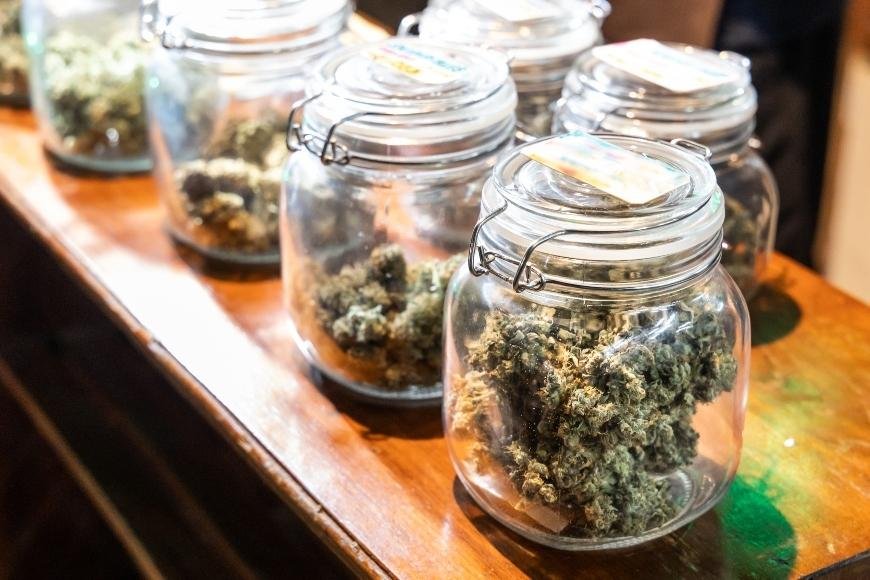
When it comes to preserving cannabis buds, we will examine the necessary conditions for keeping their potency, flavor and aroma intact. In this blog post, we will delve into understanding these factors and how they affect cannabis quality.
We'll explore the ideal conditions for storing cannabis, ensuring your buds maintain their aroma, flavor, and potency. Additionally, we will discuss various types of storage containers available on the market that can aid in preserving your marijuana buds.
Furthermore, we will highlight the benefits of proper storage techniques while providing tips on reviving old or dry cannabis. For those interested in long-term storage solutions for their precious plant material, our guide on best practices is a must-read.
Last but not least, common mistakes made when storing cannabis products should be avoided at all costs; therefore, our article also covers what not to do when attempting to store weed effectively. Armed with this knowledge about "How to Store Your Cannabis Buds," you'll ensure maximum enjoyment from your carefully cultivated collection.
Table of Contents:
- Understanding the Factors that Affect Cannabis Quality
Understanding the Factors that Affect Cannabis Quality
When it comes to storing cannabis, understanding the factors that affect its quality is crucial. Proper storage ensures your marijuana buds maintain their potency and freshness over time. The main factors affecting cannabis quality include temperature, humidity, light exposure, and air exposure.
Temperature
Ideal temperatures for storing weed are around 20°C (68°F). Higher temperatures can cause cannabinoids and terpenes to degrade faster, resulting in a loss of potency. Additionally, warmer conditions may promote mold growth on your cannabis flower.
Humidity
Maintaining proper humidity levels is essential when storing cannabis products properly. Aim for a RH level in the range of fifty-five to sixty-two percent. Too much moisture can lead to mold development while too little can result in dry plant material with diminished flavor profiles.
Air Exposure
- Oxygen: Excessive oxygen exposure accelerates cannabinoid degradation and increases the risk of mold growth on stored marijuana buds.
- Airborne Contaminants: Pollutants such as dust or pet dander may compromise the cleanliness of your stored weed if not kept in an airtight container.
Light Exposure
Cannabis buds are sensitive to direct sunlight which causes THC degradation into CBN - reducing psychoactive effects over time. It's important to store cannabis flower away from windows or other sources of natural light when possible.
Realizing the components which have an impact on cannabis quality is essential for preserving its strength and freshness. With this knowledge, it becomes easier to determine ideal conditions for storing your cannabis buds.
Ideal Conditions for Storing Cannabis
Proper storage is crucial to maintain the quality and potency of your cannabis buds. To ensure that your marijuana stays fresh and retains its cannabinoids and terpenes, it's essential to create an environment with ideal conditions. This section looks at the essential elements to bear in mind when storing cannabis.
Temperature Control
Maintaining a consistent temperature is vital for preserving the integrity of your cannabinoids and preventing mold growth on your cannabis flower. The optimal temperature range for storing weed is around 20°C (68°F). Temperatures above 25°C (77°F) can cause degradation in THC content, while temperatures below freezing can damage trichomes - both leading to reduced potency.
Humidity Management
Air humidity plays a significant role in keeping your store cannabis fresh by maintaining moisture levels within the plant material without promoting mold growth. A good relative humidity range to aim for is between 55 and 62%. Using humidity packs inside your storage container will help regulate moisture levels effectively.
Light Protection
- Avoid Direct Sunlight: Prolonged exposure to direct sunlight can degrade cannabinoids like THC due to harmful UV rays breaking down organic compounds over time. Store weed away from windows or other sources of natural light.
- Darker Containers: Dark-colored glass jars offer better protection against light than clear containers do since they block out more of the light spectrum. Consider using amber or cobalt blue jars for optimal light protection.
Air Exposure Reduction
Limiting air exposure is essential to prevent oxidation, which can lead to a loss of potency and flavor in your cannabis products. Using an airtight container, such as mason jars with rubber seals or vacuum-sealed bags, will help keep oxygen levels low and preserve the quality of your stored marijuana buds.
By creating an environment that meets these ideal conditions, you'll be well on your way to ensuring that your cannabis remains fresh and potent for as long as possible. Proper storage of cannabis is essential to ensure the quality and potency of your buds. Consequently, being aware of the ideal vessels for maintaining cannabis is essential.
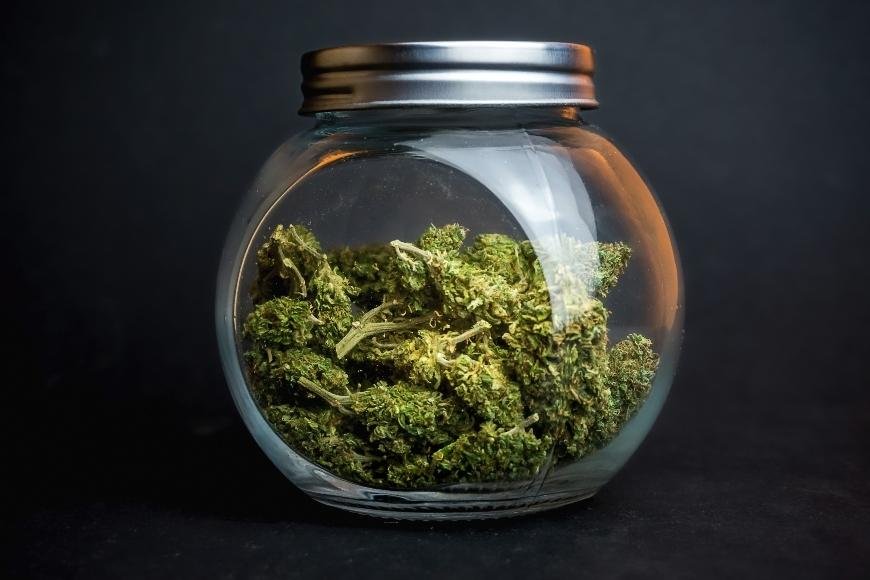
Types of Storage Containers
To ensure the quality and potency of cannabis, selecting an appropriate storage container is essential. When it comes to preserving cannabis, various storage containers exist with varying benefits and drawbacks. Let's take a look at some popular options:
Glass Jars
Glass jars, particularly mason jars, are one of the most common and effective ways to store cannabis flower. They provide an airtight seal that keeps air out while also protecting your buds from light exposure. Glass doesn't react with cannabinoids or terpenes, ensuring that your marijuana buds maintain their original flavor and aroma.
- Pros: Airtight seal, protects from light exposure, preserves flavor and aroma.
- Cons: Can be bulky or breakable.
Vacuum-Sealed Bags
Vacuum-sealed bags offer another great option for storing weed as they remove excess air from around your cannabis products properly before sealing them tight. This helps prevent oxidation which can degrade cannabinoids over time.
- Pros: Removes excess air, compact storage solution.
- Cons: May not protect against light exposure if clear plastic is used; may require additional equipment (vacuum sealer).
Airtight Plastic Containers
Airtight plastic containers can be a convenient alternative to glass jars for those who want something more lightweight or less fragile than glass but still need protection against oxygen degradation when stored correctly. However, it's important to choose high-quality plastic that won't react with the plant material or leach chemicals into your cannabis buds.
- Pros: Lightweight, durable, airtight seal.
- Cons: May not protect against light exposure; lower quality plastics can affect flavor and aroma of stored weed.
Cannabis Humidor
A cannabis humidor is specifically designed for storing marijuana buds at the ideal humidity level (around 55-62% relative humidity). These humidors often come equipped with built-in hygrometers and are made from materials like Spanish cedar that help regulate moisture levels. They provide an optimal environment for long-term storage while also adding a touch of luxury to your stash.
- Pros: Maintains ideal humidity levels, protects from light exposure, stylish design.
- Cons: Can be expensive compared to other options; may require regular maintenance (replacing humidification elements).
In conclusion, when selecting a container for storing cannabis flower, consider factors such as protection from air exposure and light degradation as well as personal preferences in terms of size and aesthetics. No matter which option you choose - glass jars or vacuum-sealed bags - make sure it meets all necessary requirements to keep your marijuana fresh and potent over time.
It is important to choose the right type of storage container for your cannabis buds in order to ensure their freshness and potency. Now, let's investigate the advantages of utilizing suitable storage techniques that can aid in maximizing your cannabis supply.
Benefits of Proper Storage
When you store weed in the right conditions, you can enjoy a better overall experience with your cannabis products. Some benefits of proper storage include:
- Prolonged shelf life: Cannabis buds that are stored properly can last for months or even years without losing their potency.
- Maintained cannabinoid content: By protecting your marijuana buds from factors like heat and light, you help preserve the cannabinoids responsible for the plant's effects.
- Better flavor and aroma: Properly storing cannabis flower helps retain terpenes, which contribute to the unique taste and smell of each strain.
- Fewer contaminants: Airtight containers keep out dust, mold spores, bacteria, and other potential contaminants that could affect your smoking experience or pose health risks.
To achieve these benefits when storing weed at home or on-the-go (for example during travels), it's important to understand how different factors impact cannabis quality over time. For instance, cannabinoids degrade more rapidly under high temperatures, so keeping your stash cool is crucial. Exposure to direct sunlight will also cause THC levels to decrease due to UV radiation; therefore,store marijuana away from windows or other sources of natural light. Lastly,humidity levels can impact the growth of mold and mildew on cannabis buds, so it's essential to maintain a balanced humidity level when storing your weed.
In addition to these factors, choosing the right storage container is key. Airtight glass containers like mason jars are often recommended for their ability to keep out air and light while maintaining consistent humidity levels. However, vacuum-sealed bags or other specialized cannabis storage products may also be suitable options depending on your needs.
Proper storage of cannabis can help preserve its potency and flavor, making it a more enjoyable experience. With that in mind, let's look at some tips to revive old or dry cannabis for optimal use.
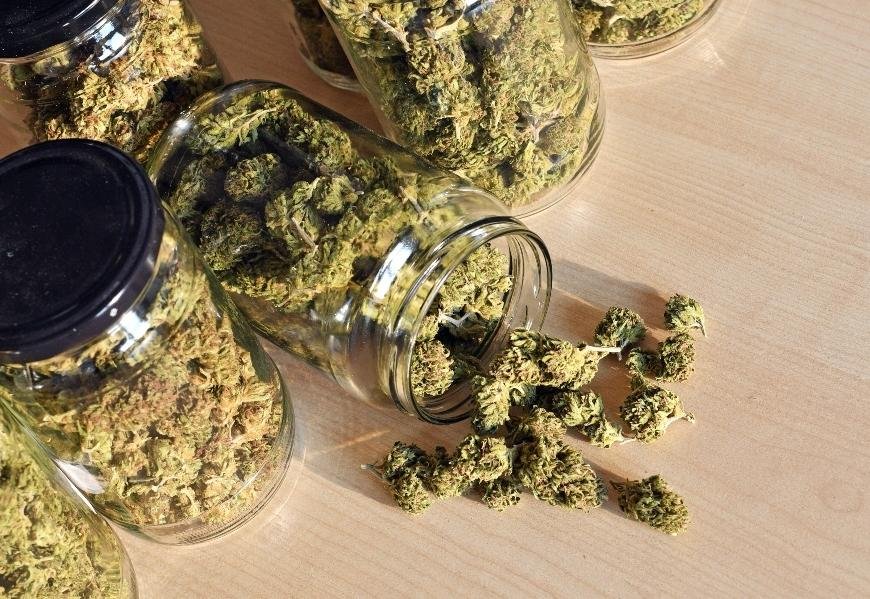
Tips to Revive Old or Dry Cannabis
Even with the best storage practices, cannabis buds can sometimes lose their freshness and become dry. Fortunately, there are several methods you can use to revive your old or dry cannabis and restore its potency. Here are some tips:
1. Use Hydration Packs
Hydration packs help maintain optimal humidity levels inside your airtight container by releasing moisture when needed. Simply place one of these packs in the container with your dried-out cannabis flower for a few days to gradually rehydrate it.
2. Add Citrus Peels
Citrus peels from fruits like oranges, lemons, or limes can be used as a natural way to add moisture back into your marijuana buds while also providing a pleasant aroma. Place small pieces of citrus peel in an airtight glass container with the dried weed for 24-48 hours, just make sure that they don't touch each other directly.
3. Use Fresh Lettuce Leaves
Fresh lettuce leaves have high water content and can effectively rehydrate your stored weed without altering its flavor profile too much if left overnight in an airstream glass jar . Be cautious not to leave them together for too long; otherwise, mold might develop due to excessive moisture.
Reviving old or dry cannabis can be done with some simple techniques, such as adding moisture and heat. Storing cannabis in the best way possible is key for preserving its freshness over time.
Best Practices for Long-Term Storage
By adhering to these guidelines, you can enjoy your favorite strains without worrying about their quality deteriorating.
Maintain Optimal Temperature and Humidity Levels
The ideal temperature for storing cannabis is around 20°C (68°F), as higher temperatures can cause the cannabinoids and terpenes to degrade. Humidity should be kept in the range of 55-62% RH to inhibit mould growth while still preserving moisture content. One way to monitor these conditions is by using a digital hygrometer/thermometer.
Use Airtight Containers Made of High-Quality Materials
- Glass jars: Mason jars or other high-quality glass containers with an airtight seal are among the best options for storing cannabis flower. They protect against air exposure while also being non-porous, which prevents odors from escaping or contaminants from entering.
- Vacuum-sealed bags: Vacuum sealing your marijuana buds in plastic bags helps minimize oxygen exposure and prolongs shelf life. Be sure not to crush delicate plant material during this process.
- Avoid cheap plastic bags: Thin plastic bags may seem convenient but they offer little protection against air exposure, light damage, or odor leakage - all factors that contribute towards degradation of stored weed.
Keep Cannabis Away from Direct Sunlight and Artificial Light Sources
Light, especially UV rays found in sunlight, can cause cannabinoids to break down and lose potency. To prevent this, store your cannabis products properly by keeping them in a dark place away from windows or other sources of direct light.
Separate Different Strains
To preserve the unique flavors and effects of each strain you're storing, it's best to keep them separated. Store different strains in individual containers rather than mixing them together - this will also help avoid any confusion when it comes time to consume your stored cannabis.
Keep Your Storage Area Clean and Pest-Free
A clean storage environment is crucial for maintaining the quality of your marijuana buds over time. Regularly check for signs of pests such as insects or rodents that could damage your stored cannabis flower. If necessary, use pest control methods that are safe for use around consumable plant material.
Proper storage of cannabis buds is essential for maintaining their potency and flavor over time. It is important to recognize the potential pitfalls of cannabis storage in order to keep your product at its peak.
Common Mistakes to Avoid When Storing Cannabis
To ensure that your cannabis buds maintain their quality and potency, it's crucial to avoid some common mistakes when storing them. By steering clear of these pitfalls, you can keep your marijuana fresh and ready for use whenever the occasion arises.
1. Using Plastic Bags or Containers
Rather than offering a convenient storage option, plastic bags can actually harm cannabis by leaching chemicals into the plant material and allowing air exposure that degrades quality. Plastic materials can leach chemicals into the plant material, affecting its taste and aroma. Additionally, plastic bags are not airtight, allowing air exposure that leads to degradation in quality over time. Instead of using plastic containers or bags, opt for glass jars or vacuum-sealed options.
2. Exposing Cannabis to Direct Sunlight
Direct sunlight has been shown to degrade cannabinoids and terpenes, which are responsible for the unique flavors and effects of each strain. Store cannabis in a cool, dark area distant from windows or other sources of direct sunlight to protect the cannabinoids and terpenes which give each strain its unique flavor and effects.
3. Storing at Incorrect Temperatures or Humidity Levels
Ideally, cannabis should be stored at around 20°C (68°F) with humidity levels between 55% - 62%. Keeping your buds within this range will help preserve their freshness while preventing mold growth due to excess moisture.
Investing in a humidity control device can help maintain the optimal environment for your cannabis storage.
4. Mixing Different Strains in One Container
Different strains of cannabis have unique flavors and aromas due to their distinct terpene profiles. Storing multiple strains together in one container can cause them to mix, resulting in a loss of individual characteristics. To preserve each strain's uniqueness, store them separately using airtight glass containers or vacuum-sealed bags.
5. Not Checking on Stored Cannabis Regularly
It's essential to periodically check on your stored marijuana buds for any signs of mold growth or degradation in quality. This allows you to address any issues before they become more severe and potentially ruin your entire stash. Regular inspections also provide an opportunity to ensure that temperature and humidity levels remain within the ideal range for storing cannabis flower.
6. Ignoring Long-Term Storage Best Practices
If you plan on storing cannabis products properly for extended periods, it's crucial to follow long-term storage best practices. These include using vacuum seal technology, maintaining consistent environmental conditions, and keeping the original container labels intact so you know exactly what is inside each jar or bag.
Avoiding these common mistakes will go a long way towards ensuring that your stored weed stays fresh and potent over time. By investing in proper storage methods like glass jars or vacuum-sealed bags while maintaining ideal environmental conditions, you'll be able to enjoy high-quality cannabis whenever you desire.
FAQs in Relation to How to Store Your Cannabis Buds
What are the best conditions to store bud?
The best way to store bud is in an airtight container, away from direct sunlight and at a temperature between 50-70 degrees Fahrenheit. It's important to keep humidity levels low (between 59-63%) as too much moisture can cause mold growth or degrade the quality of the bud over time. Periodically inspecting your buds for any changes in color or the presence of mold is advised to ensure they remain fresh until their expiration date.
Should cannabis buds be refrigerated?
No, cannabis buds should not be refrigerated. Refrigeration can cause the trichomes on the buds to become brittle and fall off, reducing potency. Furthermore, moisture from the refrigerator can lead to mold growth or other contaminants that could make smoking unpleasant or even dangerous. Keep your marijuana in a dark, arid spot away from direct sunlight to ensure optimal preservation.
How do you store harvested buds?
Buds gathered should be put away in an impermeable vessel, like a mason jar or vacuum-sealed pouch. Place the container in a cool, dark place away from direct sunlight and other sources of heat. To maintain freshness, it is best to store the buds with minimal exposure to oxygen. Check on them periodically for signs of moisture buildup or mold growth and discard any that have been compromised.
What temperature should you store bud?
Storing cannabis at temperatures between 59-63°F (15-17°C) is ideal for preserving its freshness and potency. Keeping the bud at this temperature will ensure that it stays fresh and maintains its potency. If stored in temperatures higher than 63°F, the terpenes and cannabinoids may degrade over time. Additionally, if exposed to too much humidity or moisture, mold can form on your buds. Therefore, keeping your marijuana in a cool and dry environment is essential for preserving its quality.
Conclusion
By understanding the factors that affect cannabis quality, setting ideal conditions such as keeping the temperature around 20°C, using airtight containers to store your cannabis buds in, and avoiding common mistakes like direct sunlight exposure, you can ensure that your stash will remain fresh and potent over time. By following these simple storage guidelines, you can ensure that your cannabis buds retain their quality and potency for years to come.

